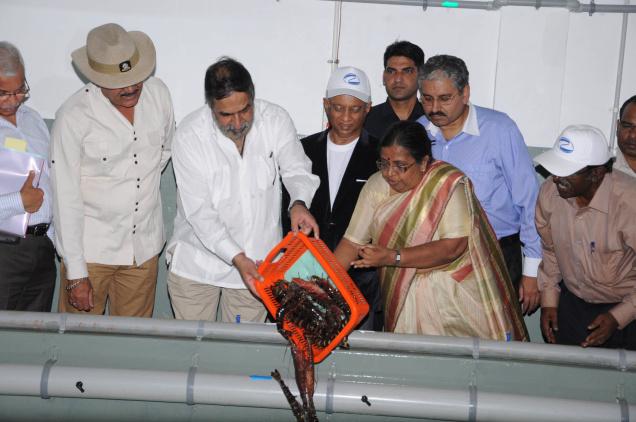 p variety found in India that once dominated the Asian aquaculture market, is getting a new lease of life.
p variety found in India that once dominated the Asian aquaculture market, is getting a new lease of life.The Rajiv Gandhi Centre for Aquaculture (RGCA), an arm of the Marine Products Export Development Authority (MPEDA), has set up a nucleus breeding centre for this species in the Andamans.
In the past, black tiger shrimps dominated the market because of their fast growth, large harvest size and attractive prices.
But in the 1990s, India was unable to sustain the aquaculture production of tiger shrimp mainly due to the spread of white spot syndrome, a viral infection that wiped out the broodstock.
Leena Nair, Chairman, MPEDA, said nearly 220 hatcheries all over the countryinvolved in tiger shrimp farming lost their broodstock. Following this, the MPEDA imported domesticated and specific pathogen free (SPF) L. vannamei (also known as Pacific shrimp) from the U.S. and supplied it to nearly 180 hatcheries. Domestication is a process by which the livestock quality is improved over successive generations of breeding to promote fast growth, better feed conversion ratio, high survival rate and resistance to diseases, she said.
Black tiger shrimp hatcheries were earlier dependent upon broodstock from the wildthat was vulnerableto disease. Hence, the MPEDA imported Pacific shrimp. Thampi Samraj, Project Director RGCA, said with the nucleus breeding centre in the Andamans, the RGCA was in the process of domesticating black tiger shrimp with specific pathogen free specimens. Dr. Samraj said the Kodiaghat facility would supply germplasm of selectively-bred families to the Broodstock Multiplication Centre at Thekkurichi in Kanyakumari district.
Mass production of shrimp would be undertaken here and stock distributed to hatcheries across the country. The commissioning of the multiplication centre at Kanyakumari would facilitate theproduction and supply of 50,000 SPF tiger shrimp broodstock per annum to the industry, resulting in the production of nearly 1 lakh tonnes of tiger shrimp. This would in turn yield nearly U.S. $ 1 billion, he said.







